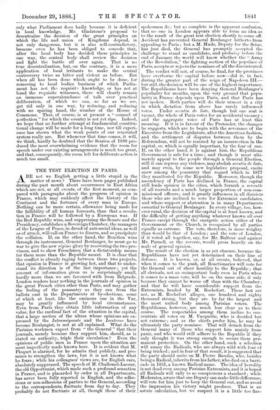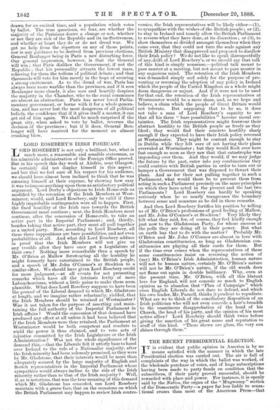THE TEST ELECTION IN PARIS.
ARE not we English getting a little stupid in the matter of news ? There have been pages published during the past month about occurrences in East Africa which are not, at all events, of the first moment, as com- pared with paragraphs about the progress of opinion in France, which may suddenly affect the history of the Continent and the fortunes of every man in Europe. Nothing can be more certain, allowance being made for the fallibility of all human forecasts, than that a revolu- tion in France will be followed by a European war. If the Red Republic wins, and suppressing the Senate and the Presidency, establishes a Sovereign Chamber, the managers of the League of Peace, in dread of anti-social ideas, as well as of attack, will call on France to disarm, and so precipitate the collision. If, on the other hand, the Reaction wins through its instrument, General Boulanger, he must go to war to give the new regime glory by recovering the two pro- vinces, and to show Frenchmen that a dictatorship means for them more than the Republic meant. It is clear that the conflict is already raging between these two projects, that opinion in France is growing hot, and that to under- stand its direction is of the last importance ; yet the amount of information given us is surprisingly small, hardly more than we are favoured with from Belgrade. London readers hear nothing in the journals of opinion in the great French cities other than Paris, and may gather the feeling of the peasantry as they can from the ballots cast in the Departments at by-elections, some of which at least, like the ominous one in the Var, may be greatly influenced by local circumstances. Even from Paris they obtain little information of any value, for the cardinal fact of the situation in the capital, that a large section of the ultras whose opinions are ex- pressed by the Intransigeante and the Lanterne have become Boulangist, is not at all explained. What do the Parisian workmen expect from "the General" that their journals, merely because they support him, should, as is stated on authority, triple their circulation ? Even the opinions of public men in France upon the situation are most imperfectly made known here. It is evident that M. Floquet is alarmed, for he admits that publicly, and pro- mises to strengthen the laws, but it is not known what he fears ; while his colleagues' views are, for English ears, absolutely suppressed. The speech of M. Challemel-Lacour, the old Opportunist, which made such a profound sensation in France, and is placarded by order in all Departments, has never been fully reported in English, and the adhe- sions or non-adhesions of parties to the General, according to the correspondents, fluctuate from day to day. They probably do not fluctuate at all, though those of their spokesmen do ; but so complete is the apparent confusion, that no one in London appears able to form an idea as to the result of the great test election shortly to come off. Accident has prevented General Boulanger hitherto from appealing to Paris ; but a M. Hude, Deputy for the Seine, has just died, the General has promptly accepted the challenge to stand as candidate, and probabiy before the end of January the world will know whether the "Army of the Revolution," the fighting section of the populace of Paris, accepts or rejects the nominee of all the discontented.
The verdict will not, of course, be final, for the provinces have overborne the capital before now—did it, in fact, during the greater part of the reign of Napoleon IlL- but still, the decision will be one of the highest importance. The Republicans have been denying General Boulanger's popularity for months, upon the very ground that popu- larity in France depends upon Paris, and that Paris has not spoken. Both parties will do their utmost in a city in which dictation from above has rarely influenced votes. Under scrutin, de liste, though but one seat is vacant, the whole of Paris votes for an accidental vacancy ; and the aggregate voice of Paris has at least this meaning. If it is in favour of the Pretender, the changes he suggests, which are to begin with the severance of the Executive from the Legislature, after the American fashion, and the settlement of disputes between them by the Referendum, will not be resisted by an insurrection in the capital, or, which is equally important, by the fear of one. If, on the other hand, it is against him, the Republican Government is safe for a time ; and though it must ulti- mately appeal to the people through a General Election, still it can repress any violence, may abolish scrutin de liste, and may even, by some new legislative proposal, excite anew among the peasantry that regard which in 1877 they manifested for the Republic. Moreover, though the ascendency of Paris has declined in France, the capital still leads opinion in the cities, which furnish a seventh of all recruits and a much larger proportion of non-com- missioned officers ; and it greatly influences in all districts those who are inclined to vote for Extremist candidates, and whose support or abstention is in many Departments essential to General Boulanger. In every village, too, how- ever rural, the decision of the capital is at least known, and the difficulty of getting anything whatever known all over France except through the energetic action either of the Government or the Church, is recognised by all parties equally as extreme. The vote, therefore, is more weighty than would be that of London ; and the vote of London, if it voted all together, say, for Mr. Balfour and against Mr. Parnell, or the reverse, would press heavily on the scale of general opinion.
The result of the election is as yet obscure, because the Republicans have not yet determined on their line of defence. It is known, or, at all events, believed, that when it comes to the push, all Reactionaries will vote for the General out of sheer hostility to the Republic ; that all clericals, not an unimportant body even in Paris when it comes to a mass vote, will be on the same side, if only because they cannot be worse off than with the Chamber ; and that he will have considerable support from the Extremists, headed by M. Rochefort. These last are not, as M. Rochefort alleges, one hundred and eighty thousand strong, but they are by far the largest and the most united body among Parisian voters. The Republicans, however, are much less clear as to their course. The respectables among them incline to con- centrate all votes on M. Vacquerie, who is decided but not extreme ; and as the chiefs prefer him, he may be ultimately the party nominee. That will detach from the General many of those who support him mainly from panic, and who would still adhere to the Republic if they only thought it was strong enough to secure them per- manent protection. On the other hand, such a selection will annoy the Radicals, who are always wild with fear of being tricked ; and in fear of that result, it is suggested that the party should unite on M. Pierre Baudin, who, besides being a Radical, inherits from his father, who died on a barri- cade in 1851, a known Radical name. The idea of heredity is not dead even among Parisian Extremists, and it is hoped all Radicals will rally to so conspicuous a standard ; while Moderates, aware that one Deputy can make little difference, will vote for him just to keep the General out, and so avoid the impression his victory might produce. That is an astute calculation, but we suspect it is a little too fine. drawn for an excited time, and a population which votes by ballot. The true questions, we fear, are whether the majority of the Parisians desire a change or not, whether or not they are sick of the Republic and its ineffectiveness, and whether at heart they do or do not dread war. We get no help from the reporters on any of those points, nor is any guidance to be derived from previous elections, General Boulanger being in Paris a new disturbing force. Our general impression, however, is that the General will win ; that Paris dislikes the Government, if not the Republic ; that his personality attracts the lowest mass, relieving for them the tedium of political debate ; and that thousands will vote for him merely in the hope of securing a strong excitement. As to the dread of war, Paris has always been more warlike than the provinces, and if it sees Boulanger more closely, it also sees and heartily despises the majority in the Chamber, who to the rural communes are almost an abstraction. Paris has never loved Parlia- mentary government, or borne with it for a whole genera- tion, and has never lost the most dangerous of all political beliefs, the confidence that if it gives itself a master, it can get rid of him again. We shall be much surprised if the great city, when asked to vote by ballot, reverses the decision of the provinces ; but if it does, General Bou- langer will have received for the moment an almost crushing blow.



































 Previous page
Previous page